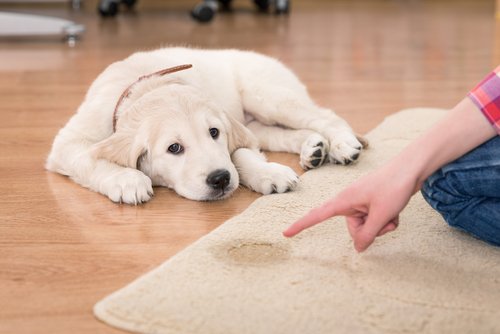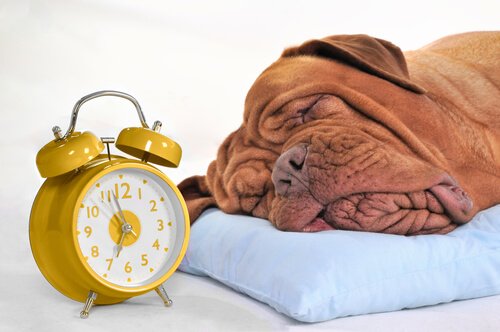Things Your Dog Hates that You Might Not Know


Written and verified by the lawyer Francisco María García
Everyone knows that dogs are loyal companions. They’re always ready to make us happy and spend time with us. However, there are some things your dog hates that you might not know about. And they may have to do with you and your routine.
5 things your dog hates about you and your routine
Our dogs are extraordinarily intelligent and sensitive, so they can easily capture stimuli that go unnoticed to us. Additionally, they mostly use body language to communicate. They’re able to ‘read’ our facial expressions, gestures and actions, even if we don’t say a single word.
That’s why it’s important for us to be attentive to the things that your dog may hate or that may bother him. If you don’t, he may start to experience stress, which could later lead to behavioral problems such as aggressiveness and destructive habits.
To help you improve your bond with your best friend, and avoid any problems in your house, we’ll tell you five things your dog hates about you and your routine:
Demonstrations of overly-human affection
People are so accustomed to showing affection with kisses, hugs, etc. But this type of affection isn’t always taken well by dogs. They don’t understand these types of social interactions.

If you think about it, a hug for your dog may seem more like ‘imprisonment’ than a gesture of love. In fact, the vast majority of dogs don’t like hugs.
Of course, dogs love to give and receive love and pampering, especially with their owners and family members. However, they have their own ways of expressing their appreciation and enjoying the company of their favorite humans.
Too many words
For us, oral language is the most important and normal way of communicating our thoughts, feelings and desires. In fact, many of us will even talk to ourselves to help us think or to prepare for a presentation or important event.

However, one of the things your dog hates is when you talk too much. Like we said before, dogs mostly use body language to communicate, through postures, actions and facial expressions. Keep in mind that you can communicate with your dog in other ways, not just orally.
This doesn’t mean that your dog doesn’t like it when you talk to him, but he does want you to use more body language to convey messages to him. By doing this, you’ll be improving the bond and relationship with your dog. So, we recommend that you learn more about canine body language.
Noisy habits and environments
It’s important to note that dogs’ senses are more developed than ours, especially their hearing and smell. It may be fun for you to turn your music up loud to sing, dance or get rid of ‘bad vibes.’

However, this is one of the things your dog hates because loud noises can scare him or make him uncomfortable. For this same reason, your dog may hide or get annoyed by noisy appliances and objects. For example, vacuum cleaners and hair dryers.
Scolding and punishments
Let’s be honest: no one likes to be shouted at, punished, locked up or humiliated. The same goes for dogs. Scolding exposes dogs to negative emotions, like fear, stress and anxiety. These are all detrimental for your pet’s physical and mental health.

In addition, punishments and violent methods are very dangerous, since animals tend to defend themselves when they feel threatened. That’s why it’s important to choose positive reinforcement dog training. This method will encourage their learning and cognitive abilities.
Lack of routine
Routines have gained a bad reputation among humans, since they’re seen as boring. However, one of the things your dog hates is not having a well-defined routine throughout the day.

Almost all animals need to cling to a routine to feel more secure, in order to avoid exposure to unnecessary risks. Of course, dogs are no exception and benefit a lot from a healthy lifestyle routine.
These good habits should include feeding times, walks, mental stimulation, rest, and, of course, fun. This will help create a good daily relationship with our pets.
Everyone knows that dogs are loyal companions. They’re always ready to make us happy and spend time with us. However, there are some things your dog hates that you might not know about. And they may have to do with you and your routine.
5 things your dog hates about you and your routine
Our dogs are extraordinarily intelligent and sensitive, so they can easily capture stimuli that go unnoticed to us. Additionally, they mostly use body language to communicate. They’re able to ‘read’ our facial expressions, gestures and actions, even if we don’t say a single word.
That’s why it’s important for us to be attentive to the things that your dog may hate or that may bother him. If you don’t, he may start to experience stress, which could later lead to behavioral problems such as aggressiveness and destructive habits.
To help you improve your bond with your best friend, and avoid any problems in your house, we’ll tell you five things your dog hates about you and your routine:
Demonstrations of overly-human affection
People are so accustomed to showing affection with kisses, hugs, etc. But this type of affection isn’t always taken well by dogs. They don’t understand these types of social interactions.

If you think about it, a hug for your dog may seem more like ‘imprisonment’ than a gesture of love. In fact, the vast majority of dogs don’t like hugs.
Of course, dogs love to give and receive love and pampering, especially with their owners and family members. However, they have their own ways of expressing their appreciation and enjoying the company of their favorite humans.
Too many words
For us, oral language is the most important and normal way of communicating our thoughts, feelings and desires. In fact, many of us will even talk to ourselves to help us think or to prepare for a presentation or important event.

However, one of the things your dog hates is when you talk too much. Like we said before, dogs mostly use body language to communicate, through postures, actions and facial expressions. Keep in mind that you can communicate with your dog in other ways, not just orally.
This doesn’t mean that your dog doesn’t like it when you talk to him, but he does want you to use more body language to convey messages to him. By doing this, you’ll be improving the bond and relationship with your dog. So, we recommend that you learn more about canine body language.
Noisy habits and environments
It’s important to note that dogs’ senses are more developed than ours, especially their hearing and smell. It may be fun for you to turn your music up loud to sing, dance or get rid of ‘bad vibes.’

However, this is one of the things your dog hates because loud noises can scare him or make him uncomfortable. For this same reason, your dog may hide or get annoyed by noisy appliances and objects. For example, vacuum cleaners and hair dryers.
Scolding and punishments
Let’s be honest: no one likes to be shouted at, punished, locked up or humiliated. The same goes for dogs. Scolding exposes dogs to negative emotions, like fear, stress and anxiety. These are all detrimental for your pet’s physical and mental health.

In addition, punishments and violent methods are very dangerous, since animals tend to defend themselves when they feel threatened. That’s why it’s important to choose positive reinforcement dog training. This method will encourage their learning and cognitive abilities.
Lack of routine
Routines have gained a bad reputation among humans, since they’re seen as boring. However, one of the things your dog hates is not having a well-defined routine throughout the day.

Almost all animals need to cling to a routine to feel more secure, in order to avoid exposure to unnecessary risks. Of course, dogs are no exception and benefit a lot from a healthy lifestyle routine.
These good habits should include feeding times, walks, mental stimulation, rest, and, of course, fun. This will help create a good daily relationship with our pets.
This text is provided for informational purposes only and does not replace consultation with a professional. If in doubt, consult your specialist.








